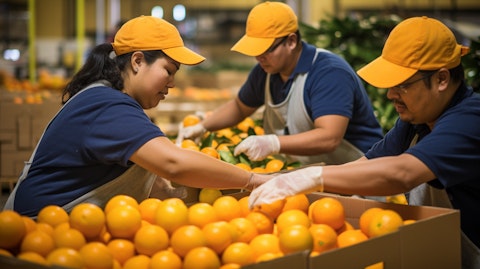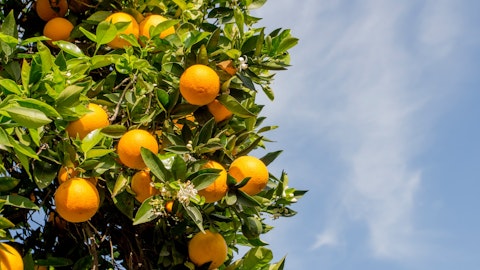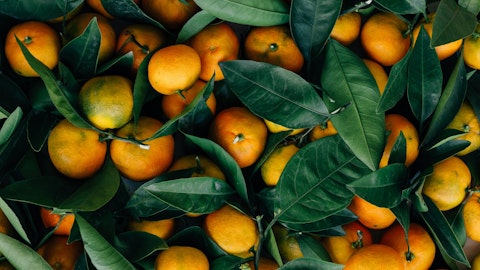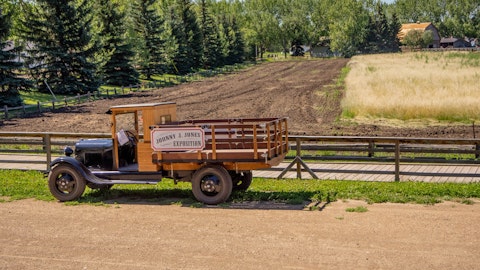Limoneira Company (NASDAQ:LMNR) Q1 2024 Earnings Call Transcript March 7, 2024
Limoneira Company misses on earnings expectations. Reported EPS is $-0.68401 EPS, expectations were $-0.29. LMNR isn’t one of the 30 most popular stocks among hedge funds at the end of the third quarter (see the details here).
Operator: Greetings, and welcome to the Limoneira First Quarter 2024 Financial Results Conference Call. At this time, all participants are in a listen-only mode. A brief question-and-answer session will follow the formal presentation. [Operator Instructions] As a reminder, this conference is being recorded. It is now my pleasure to introduce your host, John Mills with ICR. Thank you, sir. You may begin.
John Mills: Thank you. Good afternoon, everyone, and thank you for joining us for Limoneira’s First Quarter Fiscal Year 2024 Conference Call. On the call today are Harold Edwards, President and Chief Executive Officer; and Mark Palamountain, Chief Financial Officer. By now, everyone should have access to the first quarter fiscal year 2024 earnings release, which went out today at approximately 4 p.m. Eastern Time. If you’ve not had a chance to view the release, it’s available on the Investor Relations portion of the company’s website at limoneira.com. This call is being webcast, and a replay will be available on Limoneira’s website as well. Before we begin, we’d like to remind everyone that prepared remarks contain forward-looking statements, and management may make additional forward-looking statements in response to your questions.
Such statements involve a number of known and unknown risks and uncertainties, many of which are outside the company’s control and could cause its future results, performance or achievements to differ significantly from the results, performance or achievements expressed or implied by such forward-looking statements. Important factors that could cause or contribute to such differences include risks detailed in the company’s 10-Qs and 10-Ks filed with the SEC and those mentioned in the earnings release. Except as required by law, we undertake no obligation to update any forward-looking or other statements herein, whether as a result of new information, future events or otherwise. Please note that during today’s call, we’ll be discussing non-GAAP financial measures, including results on an adjusted basis.
We believe these adjusted financial measures can facilitate a more complete analysis and greater understanding of Limoneira’s ongoing results of operations, particularly when comparing underlying results from period to period. We have provided as much detail as possible on any items that are discussed on an adjusted basis. Also, within the company’s earnings release and in today’s prepared remarks, we included adjusted EBITDA and adjusted diluted earnings per share, which are non-GAAP financial measures. A reconciliation of adjusted EBITDA and adjusted diluted earnings per share to the most directly comparable GAAP financial measures are included in the company’s press release, which has been posted to our website. And with that, it’s my pleasure to turn the call over to the company’s President and CEO, Mr. Harold Edwards.
Harold Edwards: Thanks, John, and good afternoon, everyone. We are very encouraged to see our strategic shift towards an asset-lighter business model reflected in our results with agribusiness expenses decreasing by 5%, agribusiness operating loss improving by 84% and our adjusted EBITDA improving by 39% in the seasonally soft first quarter of fiscal year 2024 compared to the prior year period. Results for the first quarter were impacted by increased rainfall in California that delayed the picking of lemons from the first quarter to the second quarter. However, we do not expect the rainfall to have any other impact on the overall harvest or the quality of the fruit. Additionally, avocado harvest will begin in Q2 and run into Q3 due to the seasonality of California avocados and reduced import pressure from Mexico and Peru in the U.S. market during that period.
We believe the U.S. market window from April to July provides a niche opportunity for California avocados to serve the U.S. market demand during that time frame without significant pressure from other avocado production areas in the world, which are predominantly Mexico and Peru. Many of you have recently seen the media attention regarding avocados coming from Mexico and how the U.S. ambassador, Ken Salazar, told producers in Michoacán, Mexico, the country’s largest avocado producing state, that the United States will not import fruit grown on the illegal plantations that contribute to deforestation. To put this into perspective, approximately one-third of avocados grown in Mexico come from this state and represent approximately 800 illegal orchards.
This is the first time these orchards have been identified by authorities. The U.S., Mexican and Michoacán agencies are now working on protocols to thwart future export efforts of the illegally farmed produce. Over the past four years, Mexico has supplied 88% of fresh avocado imports to the U.S. and in 2023 alone, the United States imported nearly 2.5 billion pounds of Mexican avocados, according to the U.S. Department of Agriculture. We believe this may have an effect on imports and potentially increase the price of avocados. Turning to our recently announced decision to evaluate strategic alternatives for the overall business. Over Limoneira’s 130-year history, it has grown into one of the leading sustainable agribusiness companies in the world, with over 11,000 acres of valuable lands, real estate properties and senior water rights.
Over the past 18 months, we have developed a strategic road map intended to enhance near- and long-term shareholder value. Today, we consider ourselves to be in a strong financial position, having recently reduced our net debt position and rightsized the balance sheet through our ongoing strategic shift towards an asset-lighter business model. As part of our exploration of strategic alternatives to maximize value and due to the strong interest we have received, we have decided it is in the best interest of our stockholders to temporarily pause the sale of the two remaining non-strategic assets as well as move away from pursuing a packinghouse in Chile and instead, add value by focusing on expanding our avocado production over the next three years.
The overall improvements we are making to our business are well aligned with our strategic asset-lighter transition plan. We are working to pivot our business towards a model that will streamline our operations, sell non-strategic assets, improve the consistency of our earnings, increase EBITDA and dividends per share, reduce debt, right-size the balance sheet and improve the return on invested capital. Debt less cash on hand as of January 31, 2024, was $51.6 million compared to $105 million at the end of fiscal year 2022. Even after the recent nonstrategic asset sales, we continue to manage approximately 11,000 acres of land with approximately 21,000 acre feet of owned water usage and pumping rights. In fiscal year 2024, on the operational side of our business, you will continue to see our transition to an asset-lighter business model and focus on the best use of our assets to enhance shareholder value.
We have dramatically decreased interest expense, removed our pension obligation, are receiving quarterly payments from Yuma Mesa Irrigation and Drainage District for our fallowing program, and we believe lemon pricing will be better this year compared to fiscal year 2023, positioning us well for strong improvement in fiscal year 2024. We also have a larger avocado crop this year versus last. In addition to our operational improvements, our Board and management team will continue to evaluate how to best leverage our expertise in farm management, packing, marketing and distributing citrus combined with our valuable portfolio of agricultural lands, real estate properties and water rights in order to enhance long-term shareholder value. And with that, I’ll now turn the call over to Mark.

Mark Palamountain: Thank you, Harold, and good afternoon, everyone. Before I begin, I would remind you it is best to view our business on an annual, not quarterly basis due to the seasonal nature of our business. Historically, our first and fourth quarters are the seasonally softer quarters, while our second and third quarters are stronger. For the first quarter of fiscal year 2024, total net revenue increased 5% to $39.7 million compared to total net revenue of $37.9 million in the first quarter of the previous fiscal year. Agribusiness revenue was $38.3 million compared to $36.5 million in the first quarter last year. And our operations revenue was $1.4 million in the first quarter of fiscal years 2024 and 2023. Agribusiness revenue for the first quarter of fiscal year 2024 includes $23.9 million in fresh lemon sales compared to $24.7 million during the same period of fiscal year 2023.
Approximately 1.137 million cartons of fresh lemons were sold during the first quarter of fiscal year 2024 at a $21.06 average price per carton compared to 1.308 million cartons sold at an $18.88 average price per carton during the first quarter of fiscal year 2023. The company sold less cartons of fresh revenues — fresh lemons in the first quarter of fiscal year 2024 due to lower harvest in that period caused by the significant rainfalls California has received. Brokered lemons and other lemon sales were $2.9 million and $1.4 million in the first quarter of fiscal years 2024 and 2023, respectively. The company recognized no avocado revenue in the first quarter of fiscal year 2024 or 2023 due to the timing of harvest. The company recognized $1.1 million of orange revenue in the first quarter of fiscal year 2024 compared to $1.2 million in the first quarter of fiscal year 2023.
Approximately 80,000 cartons of oranges were sold during the first quarter of fiscal year 2024 at a $14.26 average price per carton compared to 64,000 cartons sold at an $18 average price per carton during the first quarter of fiscal year 2023. As a reminder, the company opportunistically has buy-sell arrangements for oranges with our retail and food service customers to complement our lemon sales. Specialty citrus and other crop revenue was $1.1 million in the first quarter of fiscal year 2024 compared to $1.2 million in the first quarter of fiscal year 2023. Farm management revenues were $2 million in the first quarter of fiscal year 2024, primarily due to the Northern Properties farming, management and operation services. There were no farm management revenues in the first quarter of fiscal year 2023.
Total cost and expenses for the first quarter of fiscal year 2024 were $47.5 million compared to $12 million in the first quarter of last year. The increase of $35.4 million was primarily due to the gain on the sale of the Northern Properties in the first quarter of fiscal year 2023, partially offset by decreases in agribusiness costs and expenses and selling, general and administrative expenses. Agribusiness costs and expenses declined 5% to $39.1 million for the first quarter of fiscal year 2024 compared to $41.2 million in the first quarter of last year. Operating loss for the first quarter of fiscal year 2024 was $7.7 million compared to operating income of $25.9 million in the first quarter of the previous fiscal year primarily related to the gain on the sale of the Northern Properties in the first quarter of fiscal year 2023.
Agribusiness operating loss improved 84% for the first quarter of fiscal year 2024 compared to the same period in the prior year primarily related to the ongoing execution of the strategic road map and the elimination of unprofitable operations. Net loss applicable to common stock after preferred dividends for the first quarter of fiscal year 2024 was $3.7 million compared to net income applicable to common stock of $15.5 million in the first quarter of fiscal year 2023. Net loss per diluted share for the first quarter of fiscal year 2024 was $0.21 compared to net income per diluted share of $0.84 for the same period fiscal year 2023. Adjusted net loss for diluted EPS for the first quarter of fiscal year 2024 was $3.2 million compared to $9.3 million in the same period fiscal year 2023.
Adjusted net loss per diluted share for the first quarter of fiscal year 2024 was $0.18 compared to adjusted net loss per diluted share of $0.53 for the first quarter of fiscal year 2023. A reconciliation of net loss attributable to Limoneira Company to adjusted net loss for diluted EPS is provided at the end of our earnings release. Adjusted EBITDA was a loss of $4.8 million in the first quarter of fiscal year 2024 compared to a loss of $7.9 million in the same period of fiscal year 2023. The $3.1 million improvement is a result of the actions we took last year to include exiting unprofitable farming operations in Cadiz, selling our Northern Properties to perform farm management services and entering a water fallowing program in Yuma, Arizona, which have put us in a much stronger financial position this year.
A reconciliation of net loss attributable to Limoneira Company to adjusted EBITDA is also provided at the end of our earnings release. Turning now to our balance sheet and liquidity. At the beginning of last year, we sold our Northern Properties, which resulted in a total net proceeds of $98.4 million. The proceeds were used to pay down all our domestic debt except the AgWest Farm Credit $40 million non-revolving line of credit, which has a fixed interest rate of 3.57% until July 1, 2025. Long-term debt as of January 31, 2024, was $51.4 million compared to $40.6 million at the end of fiscal year 2023. Debt levels as of January 31, 2024, minus $500,000 of cash on hand, resulted in a net debt position of $51.6 million at quarter end. Now I’d like to turn the call back over to Harold to discuss our fiscal year 2024 outlook and longer-term growth pipeline.
Harold Edwards: Thanks, Mark. For fiscal year 2024, we continue to expect fresh lemon volumes to be in the range of 5 million to 5.5 million cartons and avocado volumes to be in the range of 7 million to 8 million pounds for fiscal year 2024. We have 700 acres of nonbearing lemons and avocados estimated to become full bearing over the next four to five years, which we expect will enable strong organic growth in the coming years. Additionally, we plan to expand our plantings of avocados over the next three years and also expect to have a steady increase in third-party grower fruit. Turning to our real estate projects, Harvest at Limoneira, the Limoneira Lewis Community Builders II and East Area II, we have increased our expected total proceeds by 14% to $131 million over nine fiscal years. The increase is primarily due to increased lot pricing based on our 121 lot sales in October of 2023. And with that, I’d like to hand the call back over to the operator.
Operator: Thank you. We will now be conducting a question-and-answer session. [Operator Instructions] Our first question comes from Ben Bienvenu with Stephens Inc. Please proceed with your question.
Ben Bienvenu: Hey. Good evening. Thanks for taking my question.
Harold Edwards: Hey, Ben.
See also 13 Stocks That Will Double in 2024 and 11 Best Education Stocks To Buy In 2024.
Q&A Session
Follow Limoneira Co (NASDAQ:LMNR)
Follow Limoneira Co (NASDAQ:LMNR)
Receive real-time insider trading and news alerts
Ben Bienvenu: I want to ask first on the decision to pause the sale of non-core assets in the midst of the strategic review. Any other decisions you made around the Chile packinghouse? Is the strategic review still ongoing, and this is a discovery as a part of the strategic review or does this cease the strategic review, and these are the final conclusions of the review?
Harold Edwards: No. The strategic review is probably still in the early innings of the process. We just felt that keeping the windfall assets in Paso Robles, our vineyard there, and then the production assets in Chile as part of the overall portfolio would be an important part of the entire strategic review. So rather than peeling them off prematurely, we thought we’d keep those assets around as part of the ongoing discovery.
Ben Bienvenu: Got it. Okay. That makes sense. My second question is related to the timing shift in the harvest of lemons based on the weather that you got in the first quarter. Can you quantify the impact of that, whether it’s volume or EBITDA or however you think it is most clear to quantify the shift in that from 1Q to 2Q? And should it all shift to 2Q?
Mark Palamountain: Yes. That’s a great question. So really, we had a few weeks of consistent rains. And as you know, you can’t get into the orchards for about three or four days and touch the fruit because you get different things like oil spotting. So if you — to summarize and quantify, it’s about 200,000 to 300,000 cartons that will shift from Q1 into Q2 and probably a little bit of that into Q3 as we balance out the harvest. The crop is looking great. The quality has been there. Our utilizations have been good. So — but we’ll be able to move those out and still have that same volume and maintain our guidance from 5 million to 5.5 million cartons.
Ben Bienvenu: Okay. Great. And so there’s no impact on sizing and by extension, any impact to utilization that you anticipate from this, it’s purely just the timing of which quarter it falls into?
Mark Palamountain: Yeah, exactly. It’s not 2019, where we saw those lemons turn into great fruits and then they all had to get thrown away. So far, so good now and the weather window is opening up, and it looks like we’re supposed to get some good weather in the next few weeks. So it’s — we’re feeling good about it.
Ben Bienvenu: Okay. Awesome. I’ll get back in the queue. Thanks.
Mark Palamountain: Thanks, Ben.
Operator: Our next question comes from Ben Klieve with Lake Street Capital. Please proceed with your question.
Benjamin Klieve: All right. Thanks for taking my questions. I want to circle back on the strategic review and the two assets not being for sale. Can you clarify that, between this decision and the decision to increase avocado production, it sounds like, even more than you had already expected. Are these two decisions related or are they mutually exclusive?
Harold Edwards: Yeah. They’re mutually exclusive, Ben. At this point, when we’re looking at our One World of Citrus model, we felt it would be prudent to keep (ph) production assets as part of the overall exploration. Our decision to push pause and not move forward with investing into a Chilean packinghouse is really just driven by our desire to not necessarily deploy more — any more capital into Chile at this point, but still to maintain the supply chain that will come out of Chile by providing agency, marketing and sales services for that fruit as well as the sales and marketing and packing services for the fruit that we continue to produce in Chile. So our operations will remain intact. But as the supply chain grows, as our younger trees mature and produce more fruit and then our grower partners down there produce more fruit, we’ll continue to work with those supplies, but more on an agency basis and not necessarily packing them with our own packinghouse.
So that’s the main decision there. And as far as the decisions to not divest those assets but — and accelerate the increased plantings of avocados, that’s really just more driven by the opportunistic realization that there’s this great little niche for California avocados. We continue to believe that it’s a great use of our land as lemons have become less profitable and more oversupplied. We see the opportunity to convert some of our lemon land into avocado production in Ventura County, accelerating that increase in avocados, but then also balancing that out with our agency business and also our services of packing, marketing and selling to our grower partners, which should keep our lemon and our citrus supply chain growing while at the same time growing our own avocado production.
Benjamin Klieve: Okay. And then a couple of questions on the avocado planting specifically. One, I’m wondering if you can help kind of quantify the magnitude of the additional plantings you’re expecting over some time frame that you have visibility into. And I think you just answered my other part of this question, which is, is this going to be new acres into Limoneira or just redeploying existing acreage into avocado?




